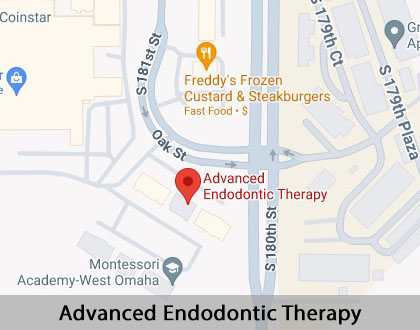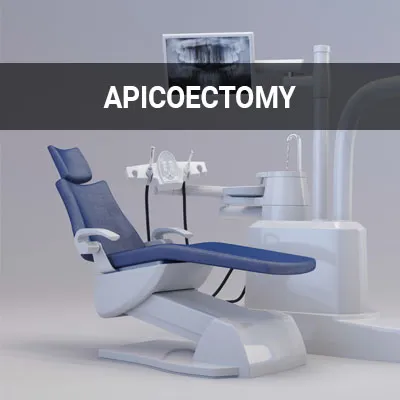Endodontic Surgery Omaha, NE
Endodontic surgery is usually necessary when a non-surgical root canal treatment is not enough to save a tooth or if a root canal fails to heal properly. While an apicoectomy is the most common procedure, endodontic surgery can repair complex injuries as well. We can use endodontic surgery to diagnose problems that are not detectable through traditional imaging or non-surgical approaches.
If you are looking to fix a failed root canal, let Advanced Endodontic Therapy in Omaha help. Our team offers a range of endodontic treatments, including apicoectomies. Call us at (402) 403-6988 to learn more.
Understanding Endodontic Surgery
Endodontic surgery is most commonly used to fix a failed root canal. However, it is also used to clean out calcium deposits that make the canal too narrow to shape in a non-surgical root canal. Endodontic surgery may be employed to treat damaged root surfaces or surrounding bone. In addition, this surgery can be exploratory, used to examine the root of one's tooth. These procedures can also help diagnose a small fracture that cannot be detected with traditional imaging or non-invasive treatments.
“Endodontic surgery is most commonly used to fix a failed root canal.”
Apicoectomy: Most Common Endodontic Surgery
If the infection persists in the bone or gum tissue surrounding the tip of the root, or apex, an endodontist will need to perform an apicoectomy. Sometimes called a root-end resection , an apicoectomy procedure involves the removal of the root apex. The endodontist will remove all infected tissue to stop the infection from spreading deeper into the jawbone and potentially causing serious complications.
“Sometimes called a root-end resection, an apicoectomy procedure involves the removal of the root apex.”
Other Types of Endodontic Surgery
Beyond apicoectomy for failed root canals, endodontic surgery may be necessary to treat other complex dental injuries. Procedures performed by an endodontist include:
- Dividing a tooth in half to repair or remove an injured root
- Intentional replantation, a procedure in which the tooth is extracted to access and treat the tissue surrounding the root and then placed back in its socket
- Reinsertion of a knocked-out tooth
“Beyond apicoectomy for failed root canals, endodontic surgery may be required to treat other complex dental injuries.”
Check out what others are saying about our dental services on Yelp: Endodontic Surgery in Omaha, NE
Preparing for Endodontic Surgery
Before someone undergoes endodontic surgery, they will have a consultation with their endodontist. The practitioner will tell them what to expect and answer any questions. The patient's experience depends on the procedure they need and the details of their condition. However, some basic steps to expect include:
- A small filling to seal the fixed tooth
- Administration of a local anesthetic to numb the surgical site
- Examination of the root and surrounding tissue
- Incision of the gums and removal of infected tissue and possibly the root
- Suturing the gums and wound dressing if needed
“The patient’s experience depends on the procedure they need and the details of their condition.”
Questions Answered on This Page
Q. When is endodontic surgery needed?
Q. What are the types of endodontic surgery?
Q. What can I expect from endodontic surgery?
Q. What happens after endodontic surgery?
People Also Ask
Q. What problems can endodontic treatment address?
Q. Why is aftercare important following dental trauma?
Q. What should a person do if a tooth is knocked out?
Q. How does an endodontist save teeth?
Q. What kind of procedure is an apicoectomy?
Q. How do I care for my teeth after a pulpectomy or root canal?
Endodontic Surgery Aftercare
Following the procedure, the patient will be instructed to rest as much as possible, and the endodontist may prescribe antibiotics along with pain medications. The patient should apply ice to the surgical site for the first 6 to 8 hours after surgery, alternating 15 minutes on and 15 minutes off. The patient should keep their head elevated with an extra pillow for the first two days. Avoid eating crunchy or hard-to-chew foods, along with overly hot or cold foods and liquids. Straws should be avoided.
Different procedures may come with other post-surgical instructions. That said, patients can expect swelling and possible bleeding at the surgical site following surgery. Use gauze to help with clotting or pack the site with dressing as a protective covering. Rinse the mouth with chlorhexidine or saltwater to keep the surgical site clean but wait at least a full 24 hours before trying to brush the teeth.
“Apply ice to the surgical site for the first 6 to 8 hours after surgery, alternating 15 minutes on and 15 minutes off.”
Frequently Asked Questions
Q. What is endodontic surgery used for?
A. Endodontic surgery is used to repair a failed root canal and treat the root surface and surrounding tissue. It may also clear calcium deposits blocking the tooth canal. Endodontic surgery may also be exploratory to help identify infection or microscopic fractures when other non-surgical approaches cannot.
Q. Why do I need an apicoectomy?
A. If the tip of a tooth root, or apex, is damaged or is surrounded by infection, you may require an apicoectomy. An apicoectomy is a surgical procedure that removes the root end and treats the surrounding tissue. This procedure helps prevent the disease from spreading into the jawbone.
Q. What surgical procedures do endodontists perform?
A. Endodontists typically reserve surgery only for complex dental injuries. Standard procedures include:
- Apicoectomy
- Dividing a tooth in half to repair or remove an injured root
- Intentional replantation, in which the tooth is extracted to treat the tissue surrounding the root and then replaced
- Reinsertion of a knocked-out tooth
Q. What happens in an endodontic surgery?
A. Endodontic surgery is an outpatient procedure. You can expect to receive local anesthesia to numb the tooth and surrounding area. The endodontist will then make an incision in order to access the damaged tissue and begin to remove any infected tissue.
Q. Can I brush my teeth following endodontic surgery?
A. You should avoid brushing for at least 24 hours. Your endodontist will provide you with specific post-surgical instructions, but generally, you will be required to rest and ice your face to help reduce residual swelling. You may receive antibiotics or pain relievers, and you should avoid eating or drinking things that will bother the surgical site.
Start Feeling Better – Visit Us Today
By visiting us as soon as possible, our team can help get you the professional treatment you need. Instead of waiting around and allowing the symptoms to get worse, we can provide you with treatment options.
Definitions
Learn More About Endodontic Surgery
To learn more about endodontic surgery, we can help. If you are in search of an endodontist in Omaha, let Advanced Endodontic Therapy help. Call us at 402-403-6988 to learn more about our services and policies.
Helpful Related Links
- American Association of Endodontists. Root Canal Post Treatment Care. 2024
- Cleveland Clinic. Chlorhexidine Oral Rinse. 2024
- Healthline. Apicoectomy: What to Know Before and After. 2024
- Journal of Endodontics. Intentional replantation. 2024
- Medscape. Exploratory Laparotomy. 2024
- National Library of Medicine. Failure of endodontic treatment: The usual suspects. 2024
- ScienceDirect. Endodontic Surgery. 2024
- StatPearls. Sutures And Needles. 2024
About our business and website security
- Advanced Endodontic Therapy was established in 2008.
- We accept the following payment methods: Cash, Discover, MasterCard, and Visa
- We serve patients from the following counties: Douglas County, Dodge County, Lancaster County, and Sarpy County
- We serve patients from the following cities: Omaha, Benson, Florence, Bellevue, Fort Calhoun, Papillion, Lincoln, Bennington, Plattsmouth, Fremont and Elkhorn, Missouri Valley, and Council Bluffs
- Norton Safe Web. View Details
- Trend Micro Site Safety Center. View Details
Back to top of Endodontic Surgery










